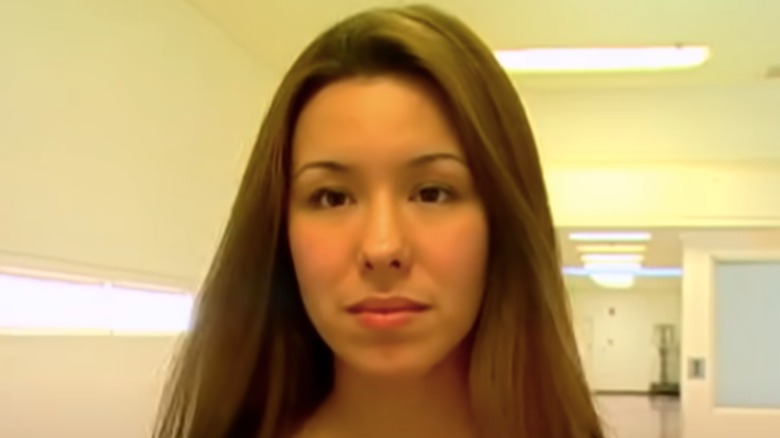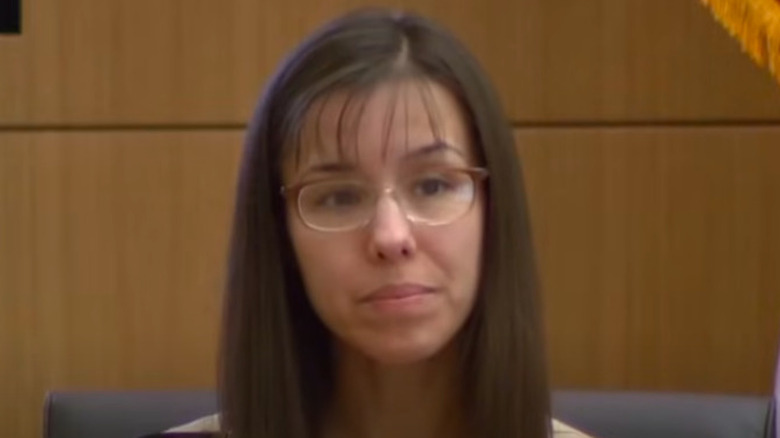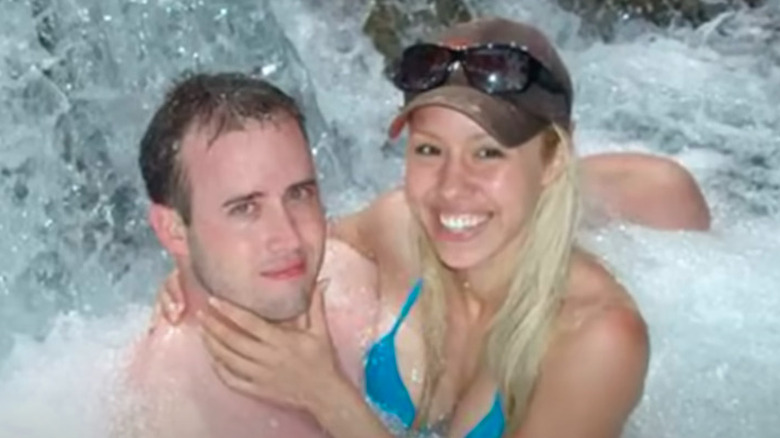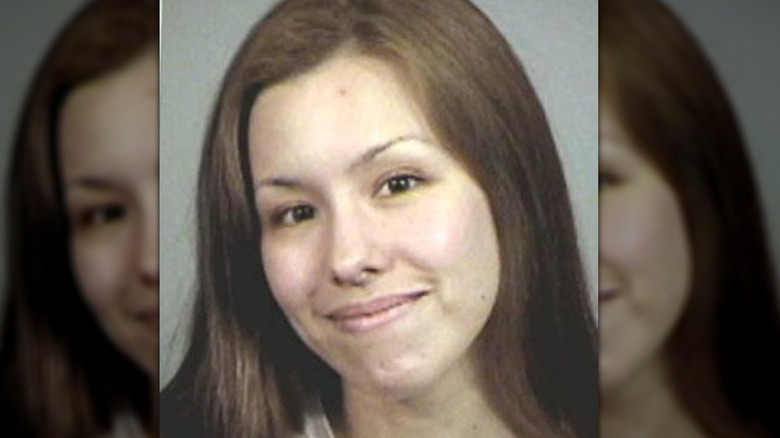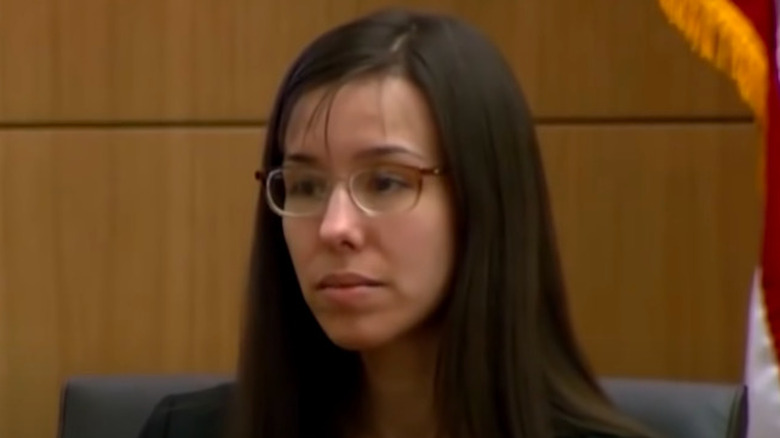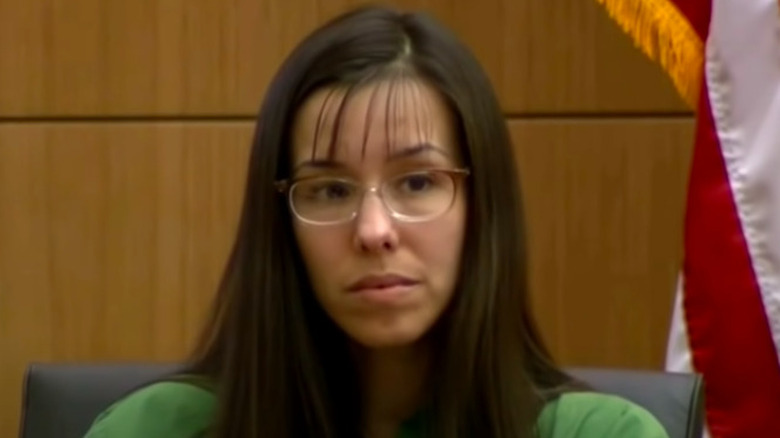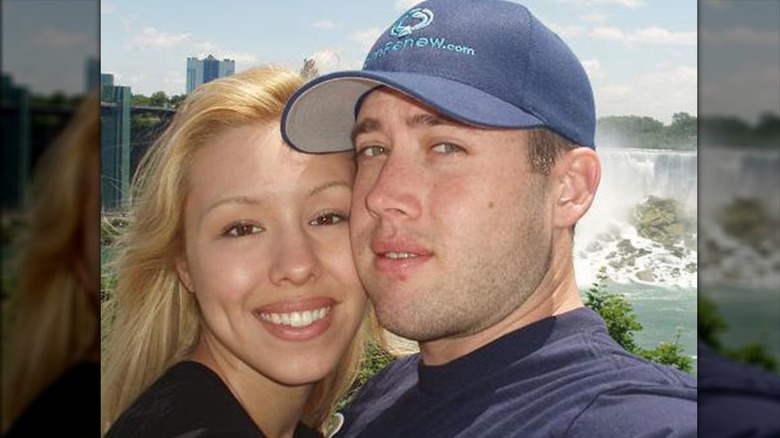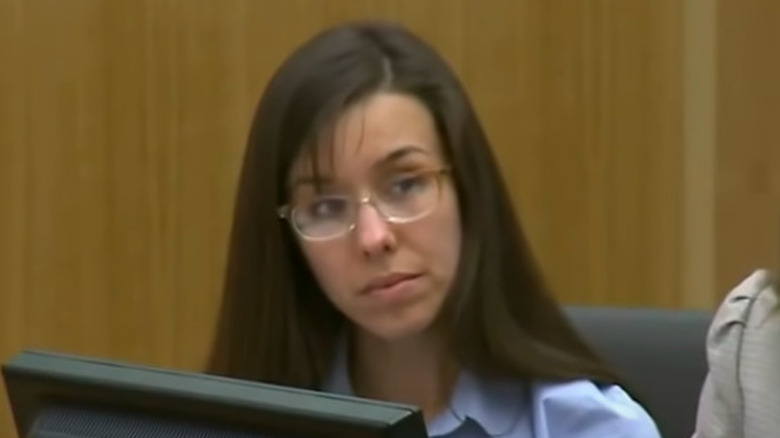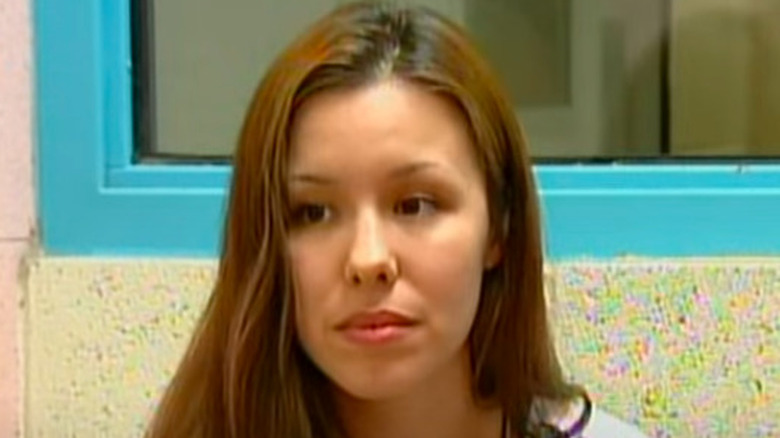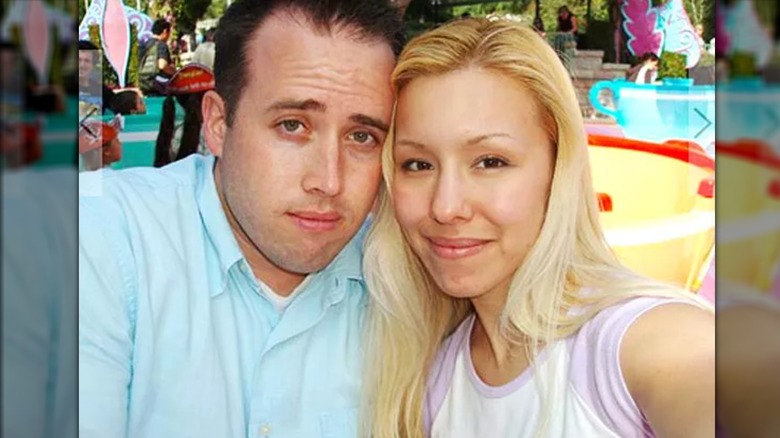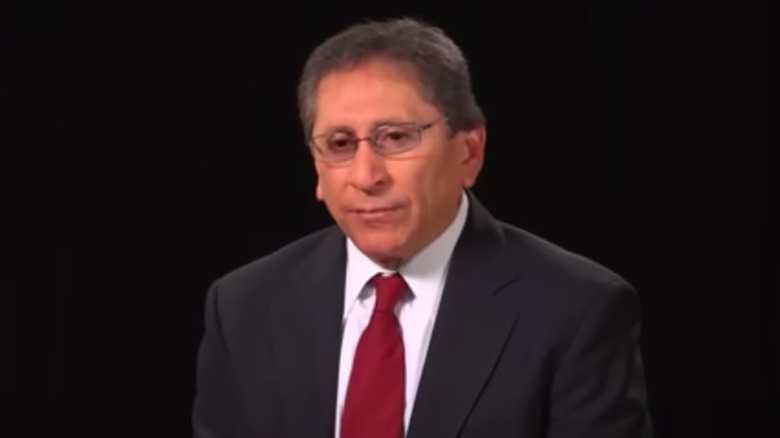All The Details About Jodi Arias' Case
Jodi Arias captivated the world after brutally murdering her ex-boyfriend Travis Alexander, thus beginning one of the most-watched trials of its time. In a twisted Mormon love story, the pair fell in and out of love rapidly, with toxicity and jealousy causing a major divide in their relationship. It ended in Alexander's grisly slaying in his Arizona home and a subsequent trial filled with bizarre, unexpected moments that still have those familiar with the case reeling to this day.
Arias first met Alexander at a Las Vegas conference in 2006, when she was working as a photographer and saleswoman, and he was selling legal insurance. The two immediately hit it off, with the California native converting to Mormonism just two months before they began dating. They dated from February until June of 2007, before breaking things off, but the exes continued to see each other after the split.
Jealousy seemed to fuel Arias' rage in the months to follow, with claims of her slashing tires and sending anonymous texts to the women in Alexander's life. While the exes met up several times after their break-up — even traveling to several states together — their relationship grew toxic. Alexander was found dead in June of 2008 after his friends failed to get in touch with him for days on end. Arias was later arrested for the murder, taking the stand in a trial that often left more questions than answers. Here's a look at all the harrowing details about the Jodi Arias case.
Travis Alexander's friends noticed red flags about Jodi Arias
Long before Travis Alexander was murdered, friends of the Arizona native say they picked up on serious red flags regarding Jodi Arias. From her jealous ways to how she moved in public, Arias' behavior had people questioning her intentions early on.
At the beginning of their relationship, Arias and Alexander's infatuation for one another was obvious. "She was really excited about the relationship," recalled Alexander's friend Sky Lovingier Hughes to ABC News. "She loved how funny he was, how much fun they would have together." Arias and Alexander maintained a long-distance relationship for several months, often meeting up at a friend's place in California to see each other. However, their love story quickly deteriorated, and Alexander's friends noticed some warning signs about Arias in the early stages.
"I started seeing things that were just disturbing," Lovingier Hughes shared. "I said, 'Travis, I'm afraid we're gonna find you chopped up in her freezer.' ... From very early on, she was completely obsessed with him." She described Arias as "very possessive of him," often going through his cell phone, following him to the bathroom, and even forwarding his email conversations to herself. Lovingier Hughes and her husband Chris attempted to talk to Alexander about her behavior and later caught Arias eavesdropping nearby. "There was a rage in her eyes ... Sky and I are very frightened at this point. She might burn down our house, you know, with all of us in it," remembered Chris.
Alexander was found brutally murdered in his Arizona home
Many of Travis Alexander's friends grew increasingly worried during the first week of June 2008, after calls and texts to their friend continued to go unanswered. After five days of radio silence, a group of his friends went to his house on the 9th, only to find him dead in his stand-up shower at his Arizona home.
The crime scene was disastrous, with Alexander suffering a gunshot to his head, a cut throat, and almost 30 stab wounds before his death. Investigators ultimately revealed that the slaying took place five days before, on June 4. Arias (who later admitted to killing Alexander in self-defense) attacked him with such force that she almost punctured his spinal cord. The Maricopa County medical examiner also concluded that the bullet wound to Alexander's head was most likely shot after his death due to the lack of blood near the entry point.
Prosecutors later revealed that Alexander's murder took place shortly after the pair engaged in intercourse and took nude photos of each other. After getting into a heated argument, Arias attacked her former lover, chasing him down the hall as he attempted to flee. She would later claim self-defense, while prosecutors argued that the murder was premeditated.
She asked to put makeup on for her booking photo
Jodi Arias exhibited incredibly strange behavior while being interrogated for the murder of Travis Alexander, from makeup touch-ups and acrobatics to even singing Christian hymns. In a case that drew global attention, Arias' bizarre antics took center stage.
ABC News posted a video of Arias during questioning in which the California native asks the investigator if she can apply makeup before her booking photo. "This is a really trivial question, and it's going to reveal how shallow I am, but before they book me, can I clean myself up a little bit?" she asked at the time. Arias proceeds to sing "Oh Holy Night" when left alone in the interrogation room and even does a headstand. "I noticed there was carpet on the floor and I thought, 'This might be the last time I see carpet,' so, I'm going to do a headstand," the California native recalled.
In a mugshot-gone-viral, her booking photo featured her smirking at the camera, sans makeup but seemingly carefree. When asked about the photograph in a later interview with CBS News' "48 Hours," she said she was inspired to smile by Alexander. "He would be smiling ... he would just flash this grin that he always does. So there was part of that, and then also part of the fact that I knew it would be all over the internet, so why not?"
Arias' story changed multiple times
It would be a long time before the jury would hear Jodi Arias confessing to killing Travis Alexander. After her initial arrest shortly after the murder, Arias' convoluted trail of lies began — and would continue for years until she finally told her version of the truth.
Arias was indicted on the charge of first-degree homicide on July 9, 2008, after multiple samples of her DNA were collected at the scene of the crime. But the California native denied any involvement in the slaying of her ex-boyfriend initially, saying she never entered his Arizona home on the night of the murder. Eventually, Arias changed tune, telling investigators that a masked man and a woman were responsible for barging into Alexander's home and murdering him.
But in 2010, Arias changed her story once again, confessing to killing Alexander in self-defense. In her testimony, she claimed that her ex-boyfriend became livid after she dropped his camera and proceeded to body-slam her to the floor. She admitted to grabbing a gun from his shelf and attempting to flee before Alexander grabbed her waist and lunged at her while the gun went off. Arias recalled him saying 'f***ing kill you b****,'" before she reportedly blacked out (via ABC News).
"I have no memory of stabbing him," she admitted per ABC News). "There's a huge gap. I don't know if I blacked out or what, but there's a huge gap." After the murder, Arias decided to lie to her loved ones out of shame before coming clean years later.
The case captivated the media in what was one of the biggest trials of the century
When the trial of Jodi Arias began in 2013, millions tuned in to one of the most-watched cases of its time. The televised trial became a media circus, not only because of Arias' antics but also due to the prosecution seeking the death penalty in addition to first-degree murder. Throughout the trial, news stories went rampant, including live coverage from former HLN reporter and former prosecutor Nancy Grace. According to an expert hired by Arias' defense team (via USA Today), there were over half a million tweets related to the trial, not to mention a made-for-TV film, as well as several documentaries, books, and podcasts.
People were captivated by the case for several reasons, including its gruesome details and contradictions. Arias and Alexander (both practicing Mormons at the time) shocked the world when their sex-filled adventures and racy text exchanges were included as evidence. Arias and Alexander's sex life became a huge focus when she took the stand as Mormons are expected to abstain from pre-marital sex.
Another reason why the case drew so much attention was the photographs taken of Alexander by Arias just moments before and after his death. Amid the struggle, the digital camera snapped photos as it fell to the ground and even captured a photo of the back of his bloody head with Arias' foot standing next to his body.
Arias claimed Alexander was a 'sexual deviant' with a pedophilia problem
While the prosecution painted Jodi Arias as a cold-blooded killer who set out to murder Travis Alexander in a premeditated attack, the defense team had a far different strategy. Attorneys for Arias relied on her claims that Alexander was an abusive partner, revealing shocking information that accused him of being a "sexual deviant" with an interest in young boys.
The California native testified during her trial that her ex-boyfriend had a secret affection for young boys and grew increasingly violent towards her once she discovered this information. Arias claimed that she stumbled upon Alexander masturbating to photos of young boys, which left her incredibly distressed. In the months that followed, Arias shared on the stand that she noticed a shift in his behavior when she suggested he seek treatment for his alleged pedophilia problem.
Arias recalled one incident in which she said Alexander broke her finger after a scuffle. "He told me he needed to borrow $200, and I didn't have it, and I had just lent him $699 a few days prior," she remembered on trial (via ABC News). "He walked across the room and started shaking my shoulders and said, 'I'm f***ing sick of you' and slammed me on [the] floor at the foot of his bed." She explained on the stand that she was afraid to speak to police out of loyalty to Alexander, and would often submit to his alleged strange requests, like wearing boys' Spiderman underwear and engaging in oral sex on his front porch.
Jury dismissals shook up the courtroom
Finding an impartial jury to sit through the Jodi Arias trial proved difficult. Multiple jurors were dismissed throughout the trial due to misconduct, making for a prolonged judicial process.
A total of three jurors were dismissed in April 2013, after several months of hearing testimony. According to RadarOnline, Juror No. 8 was let go after a DUI charge and spilling the beans on the controversial case. "During the arrest, Mr. Gibb claimed that he was a juror currently sitting on the Jodi Arias trial," recalled Lieutenant Lyle, adding, "On Tuesday, the arresting officer, Officer Robinson, was called to the court to speak in a sealed meeting with the judge, the prosecutor, and the defense attorneys handling the trial."
Juror No. 11 was also dismissed from the case due to health reasons a few weeks before Juror No. 8's arrest. The first to be taken off the jury was Juror No. 5, who was removed from the case for making impartial comments to other jury members during a private meeting, according to court documents obtained by ABC News. Arias' legal team filed a motion for a mistrial due to the discrepancies within the jury, especially with prosecutor Juan Martinez contributing to the media frenzy by taking photos and signing autographs outside the courthouse. The judge declined their request, however, and the case proceeded.
She live-tweeted from jail
As if the Jodi Arias case couldn't get any more bizarre, she began tweeting from jail. While in prison awaiting the end of her trial, Arias had a friend tweet updates from her account as she waited to find out if she would receive the death penalty.
Arias became close with her cellmate Donavan Bering while awaiting her trial start date, and once the latter was released from prison, she agreed to keep Arias' social media up to date. Bering was responsible for tweeting Arias' thoughts after an intense grilling by the prosecution, in which Arias tweeted at the time, "Hmmm ... Anger Management problems anyone?" (via RadarOnline).
"I did it because I felt she needed help," Bering told Fox News, adding that she would want her artwork posted or the books she was reading shared. "She would send the information and talk to me on the phone, and I would post it exactly how she wanted it. I did it because I supported her at the time and it kept me busy," Bering explained. "She would have called me all day long if she could just to get things out there."
Eventually, Bering noticed Arias' more sinister side. "I remember there was a time I refused to post some very horrible things about her family," Bering revealed, adding, "... She tried to lash out at me and have people she knew attack me and my family. It made me feel really bad. I felt betrayed. I couldn't understand it. I was floored to see that come out of her."
Arias was convicted of first-degree murder and given a life sentence
Jodi Arias was found guilty of the gruesome murder of Travis Alexander in May 2013. Four women and eight men who made up the jury came to that conclusion after 15 hours of deliberation and a slam-dunk case by the prosecution full of irrefutable evidence. The defense team successfully proved that Arias took a gun from her grandparents' house and drove to Alexander's home to murder him.
But Arias' case was far from over after the guilty verdict was announced. The trial then moved into the aggravation phase, or penalty phase, which determined whether or not Arias deserved to be sentenced to death for her crimes. According to the Death Penalty Information Center, crimes that constitute a death penalty sentence must prove a certain level of evidence showing that the act was committed in a "heinous, cruel or atrocious manner."
Shortly after her conviction, Arias spoke to reporters outside the courthouse, admitting she preferred death over life in prison. "Longevity runs in my family, and I don't want to spend the rest of my natural life in one place," Arias shared with Fox affiliate KSAZ (via the Associated Press). "I believe death is the ultimate freedom and I'd rather have my freedom as soon as I can get it."
The jury was undecided on whether or not she deserved the death penalty
Once the Jodi Arias trial entered the penalty phase, the same team of jurors heard victim statements from Travis Alexander's family members. Powerful arguments from his siblings had Arias in tears as they described the horrific nightmares and images that continue to haunt them.
"Our minds are permanently stained with the images of our poor brother's throat slit from ear to ear," Travis' sister Samantha Alexander stated (via CBS News). "To have Travis taken so barbarically is beyond any words we can find to express our horrific loss." She also added that their grandmother died around the time of jury selection after her health started declining when Travis was killed. "I don't want these nightmares anymore. I don't want to see my brother's murderer anymore," said Travis' brother Steven (via MassLive).
The jury, however, remained undecided on whether or not Arias deserved the death penalty. After reporting for the second time that they could not come to an agreement on Arias receiving the death penalty, the judge announced a mistrial. A new jury was sat for the retrial that began in October 2014, but jurors were also deadlocked on the decision, with one single juror sparing Arias' life. "It is something I got a lot of thought to," the woman known as Juror No. 17 told 12 News Arizona (via The Washington Post). "I didn't vote for life on a whim." Arias was ultimately given a life sentence without the possibility of parole in April 2015.
Arias' appeal was shot down by the courts
Jodi Arias sought an appeal for her first-degree murder conviction in 2018, citing certain factors within the trial that prohibited her from a fair and unbiased jury. The California native's team of lawyers argued that media coverage surrounding the case as well as prosecutor Juan Martinez's alleged misconduct were the main factors as to why the case should be granted a retrial.
While a panel of three judges did agree that Martinez engaged in volatile behavior towards "each witness whose testimony was inconsistent with the state's theory of the case," they could not find substantial evidence to overturn her guilty verdict. Arias made a crowdfunding page to raise money in the post-conviction relief stage. This phase of her case refers to the gathering of new potential evidence to present to the trial court to possibly overturn a conviction.
The lead prosecutor in the Jodi Arias case was later disbarred
Another strange twist involving the Jodi Arias trial was the future of prosecutor Juan Martinez. The lawyer's behavior was often called into question throughout the trial, often berating Arias for her lack of understanding or accusing her of having problems remembering things. While he was able to score a guilty verdict, Martinez's bad behavior caught up to him.
The Arizona prosecutor agreed to be disbarred in July 2020 after multiple women accused him of sexual assault at the Maricopa County Attorney's Office. Several months prior, Martinez was dismissed from that same office due to the allegations. He was also accused of leaking information about the Jodi Arias trial to a blogger and lying to officials about having a physical relationship with the woman. While Martinez agreed to the disbarment, the decision does not mean he admitted guilt but simply chose not to defend himself in court over the charges.

